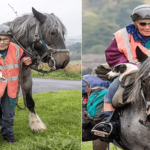Journey of Growth and Achievement

Love often arrives quietly, in ways we might not notice at first. It hides in the daily routines, the small gestures, and the choices we make when no one is watching. It is found not in grand speeches or dramatic declarations, but in persistence, patience, and the willingness to put someone else before ourselves. Sometimes love is loud, but more often it is a gentle, steady force that shapes lives in ways that are invisible, yet profound.
There was a young woman named Clara who lived in a bustling city. She worked long hours in a small café, barely making enough to pay her rent. Each day, she greeted customers with a smile, even when exhaustion weighed heavily on her. One evening, as she closed up, she noticed an elderly man shivering on the steps outside. Without hesitation, she offered him her jacket and a warm cup of tea from the café. He smiled, his eyes wet with gratitude. Clara thought little of it at the time, but years later, the man’s grandson recalled that night as a pivotal moment: a stranger’s kindness had restored his grandfather’s faith in humanity during a time when he had felt forgotten.
Love is not always about comfort; sometimes it is about courage. A soldier returning from war carried scars both visible and hidden. He found it difficult to reconnect with his family, haunted by memories no one could understand. His daughter, only eight years old, sat beside him one night and said, “Daddy, will you read me a story?” At first, he hesitated, feeling unworthy of her simple request. But he read, word by word, and in those small acts of attention, the barriers between them began to dissolve. Love can demand that we confront our own pain in order to heal someone else.

In another part of the world, a small village was devastated by a flood. Families lost homes, belongings, and in some cases, their livelihoods. Amid the chaos, neighbors formed chains to pull people from rising waters. A teacher shared her food with children she had never met. Strangers opened their doors to shelter families whose homes were destroyed. The floodwaters eventually receded, but the bonds formed in those moments endured. When disaster strikes, love often appears in its rawest form: selfless, courageous, and uncalculating.
Even in ordinary lives, love is found in the quiet sacrifices that go unnoticed. A father works two jobs to support his children, missing birthdays and school events. A mother spends sleepless nights caring for a sick child, even when her own body aches. Friends stay by each other’s side through heartbreak, illness, and disappointment. These acts rarely receive acknowledgment, yet they carry more weight than any accolade or reward. Love is not measured by recognition, but by consistency, patience, and the willingness to endure for someone else’s sake.
Children often show us the purest forms of love. In a classroom, a boy noticed a classmate eating lunch alone. Without hesitation, he offered half of his sandwich and invited the boy to join his friends. The boy had nothing to gain except the joy of helping someone who needed it. Small gestures like this ripple outward, shaping the world in ways we cannot always see. Love does not require wealth, status, or grandeur; it only requires empathy and action.
Strangers can also teach us about love’s power. A man once saw a mother struggling to calm her crying baby on a train. He offered her a handkerchief, a smile, and quietly gave her space while holding the baby’s bottle steady for a moment. The mother’s tears turned to relief, and in that brief encounter, both felt a human connection that transcended words. Love sometimes exists simply in noticing another person, acknowledging their presence, and responding with compassion.
Loss and grief do not erase love; they transform it. A widow continued to set a place at the table for her late husband, cook his favorite meals, and speak to his photograph as if he were still there. Friends thought it unusual, but she understood that love does not vanish with death. It endures in memory, in ritual, and in the quiet ways it shapes our hearts. Through loss, love becomes a living legacy, a bridge between past and present.
The most extraordinary love often appears in the most ordinary moments. A bus driver noticing a lonely passenger, a neighbor helping a single parent carry groceries, a teacher staying late to help a struggling student—these acts may seem small, yet they build the invisible scaffolding of human connection. Love thrives in perseverance, patience, and quiet attention to the needs of others. It is not flashy, but it is transformative.
At the end of life, what we remember is not our possessions, titles, or achievements. We remember the moments of love: the embrace of a friend, the laughter of a child, the patience of a parent, the kindness of a stranger. These are the treasures that endure. Every small act of love adds to a legacy far greater than wealth or fame.
Every day presents a choice: to act with love, or to act in indifference. Often, love demands courage, patience, and humility. It asks us to forgive, to listen, to endure, and to give without expecting anything in return. And yet, each choice to act with love multiplies, spreading outward in ways we may never see. It is the single force capable of transforming lives, communities, and even generations.
Ultimately, love is not a part of life—it is the essence of life. It flows through our actions, our words, and our presence. It is the thread that binds humanity, the force that gives meaning to our existence, and the legacy that outlives us all. Choosing love, again and again, in moments both large and small, is how we ensure that the world is not only lived in, but truly felt.
And so, every act of care, every word of kindness, every gesture of patience is a seed planted. With time, these seeds grow into something greater: hope, connection, and the enduring proof that life is meaningful when it is shared, and love is the gift we give that never runs out.











